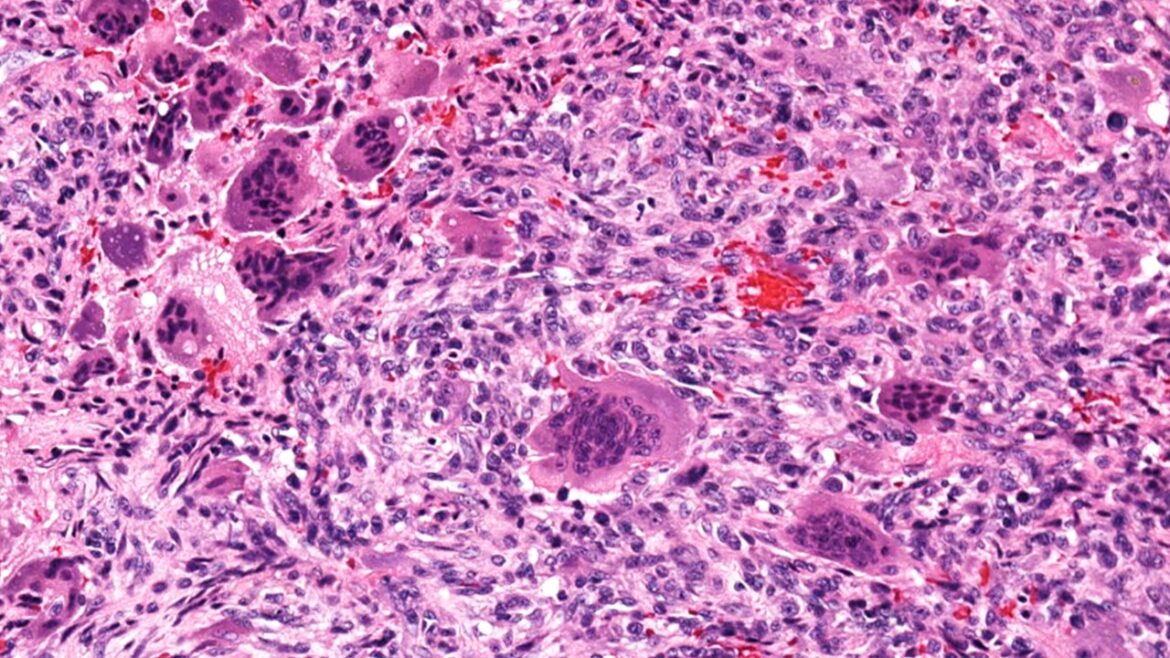Introduction
Why Does Giant Cell Arteritis Cause Weight Loss: Giant Cell Arteritis (GCA), also known as temporal arteritis, is a chronic inflammatory disease primarily affecting medium and large arteries, especially those in the head, particularly the temporal arteries. This condition is most common among individuals over the age of 50 and is characterized by a range of symptoms, including severe headaches, jaw pain, vision problems, and fatigue. One intriguing and often perplexing aspect of GCA is its association with weight loss in affected individuals.
Weight loss is a significant concern for patients with GCA and their healthcare providers. It is not uncommon for individuals diagnosed with GCA to experience unexplained weight loss, which can be both distressing and debilitating. To understand why Giant Cell Arteritis causes weight loss, it is essential to delve into the complex interplay of factors involved in this enigmatic disease.
First and foremost, GCA is an autoimmune disorder, meaning the body’s immune system mistakenly attacks its own tissues and organs. In the case of GCA, the immune system targets the blood vessel walls, leading to inflammation and damage. This chronic inflammation can result in a host of systemic effects, including anorexia, malaise, and reduced appetite. As a result, individuals with GCA may experience a decreased desire to eat and may struggle to consume an adequate amount of calories, leading to weight loss.

Do You Lose Weight With Giant Cell Arteritis?
The symptoms of giant cell arteritis change over time, but the condition most often begins with a persistent headache, typically around the temples. People with giant cell arteritis can then develop fatigue, loss of appetite, a flu-like feeling, and weight loss.
Yes, weight loss is a common and concerning symptom associated with Giant Cell Arteritis (GCA). This autoimmune condition primarily affects the medium and large arteries, leading to inflammation and damage in the blood vessel walls. While weight loss may not be the most prominent or initial symptom of GCA, it can manifest as the disease progresses, often contributing to the overall debilitation experienced by affected individuals.
Several factors contribute to weight loss in GCA patients:
Anorexia and Reduced Appetite: Chronic inflammation, a hallmark of GCA, can lead to anorexia, which is a loss of appetite. This means individuals with GCA may have a diminished desire to eat, making it difficult for them to consume enough calories and nutrients, leading to weight loss.
Fatigue and Malaise: GCA can cause extreme fatigue and a general feeling of unwellness. This can further reduce an individual’s motivation to eat and engage in physical activities, contributing to weight loss.
Metabolic Disturbances: Chronic inflammation can disrupt normal metabolic processes in the body. This may result in increased energy expenditure and alterations in how nutrients are absorbed and utilized, potentially leading to weight loss.
Corticosteroid Treatment: Corticosteroids are the primary treatment for GCA, and while they can effectively manage inflammation, they come with side effects. Steroids can increase the breakdown of muscle tissue and redistribute fat, causing muscle wasting and weight loss.
Does Temporal Arteritis Cause Weight Loss?
A new headache, tenderness of the scalp, muscle aches, weight loss, and fevers are characteristic symptoms of temporal arteritis. It is also common to experience aching or pain in the jaw muscles when chewing (called jaw “claudication”). Visual loss occurs in about 25% of patients with temporal arteritis.
Yes, Temporal Arteritis, also known as Giant Cell Arteritis (GCA), can cause weight loss in affected individuals. GCA is a chronic inflammatory condition that primarily affects medium and large arteries, with a predilection for the temporal arteries. While the hallmark symptoms of GCA often revolve around headaches, jaw pain, and vision problems, weight loss can be a significant and troubling aspect of the disease for many patients.
Several factors contribute to weight loss in individuals with Temporal Arteritis:
Anorexia and Reduced Appetite: Chronic inflammation, a defining feature of GCA, can lead to anorexia, which is a loss of appetite. This reduced desire to eat can result in decreased calorie intake, leading to weight loss.
Fatigue and Malaise: GCA can cause severe fatigue and a general feeling of unwellness. This fatigue can reduce a person’s motivation to eat and engage in physical activities, which can contribute to weight loss.
Metabolic Effects: Chronic inflammation can disrupt normal metabolic processes in the body. It may lead to increased energy expenditure and alterations in nutrient absorption and utilization, potentially causing weight loss.
Corticosteroid Treatment: Corticosteroids, such as prednisone, are the mainstay of treatment for GCA as they help control inflammation. However, these medications can have side effects, including muscle wasting and redistribution of fat, which can result in weight loss.
Does Giant Cell Arteritis Affect The Whole Body?
Giant cell arteritis affects medium-to-large arteries. It causes inflammation, swelling, tenderness, and damage to the blood vessels that supply blood to the head, neck, upper body, and arms.
Yes, Giant Cell Arteritis (GCA), also known as temporal arteritis, is a systemic inflammatory disease that can affect the entire body, even though it primarily targets medium and large arteries, particularly those in the head. This condition is not confined solely to the arteries but can have far-reaching implications for various organs and systems throughout the body. Here’s how GCA can affect the whole body:
Arterial Inflammation
GCA is characterized by inflammation of the arteries, which can occur in various parts of the body. While it commonly affects the temporal arteries (located in the head), it can also impact arteries in the neck, arms, and other areas. This arterial inflammation can lead to a range of symptoms, including severe headaches, jaw pain, and vision problems.
Systemic Inflammation
GCA is considered a systemic inflammatory disease, meaning that the inflammation doesn’t remain localized to the arteries. It can trigger a cascade of immune responses that affect the entire body. This systemic inflammation can lead to symptoms such as fatigue, muscle pain, and malaise.
Weight Loss
As discussed in previous responses, GCA is associated with weight loss. Chronic inflammation, reduced appetite, and metabolic disturbances can contribute to weight loss in affected individuals.
Vision Impairment
GCA can cause inflammation of the arteries supplying blood to the eyes, leading to vision problems, including double vision or even sudden and permanent vision loss. This is one of the most serious and potentially debilitating complications of the disease.
Cardiovascular Complications
Inflammation of the arteries can weaken their walls and lead to an increased risk of cardiovascular complications such as aneurysms, stroke, and heart attack.
Musculoskeletal Symptoms
GCA can cause muscle pain and stiffness, especially in the shoulders and hips. This can limit mobility and result in discomfort.
What Is The Most Common Complication Of Giant Cell Arteritis?
The most feared complication of giant cell arteritis is irreversible vision loss. Other complications include aortic aneurysms, which can rarely rupture, and cerebrovascular events in the vertebrobasilar distribution.
The most common and potentially serious complication of Giant Cell Arteritis (GCA), also known as temporal arteritis, is vision loss or visual impairment. This complication occurs due to the inflammation of arteries that supply blood to the eyes and the structures around them. Here’s a closer look at why vision loss is the primary concern in GCA:
Ocular Ischemia: GCA primarily affects the arteries, and when these arteries become inflamed and narrowed, it can reduce the blood flow to the eyes. The inadequate blood supply can lead to a condition called “ocular ischemia,” where the tissues in and around the eyes do not receive enough oxygen and nutrients.
Anterior Ischemic Optic Neuropathy (AION): A particularly concerning form of visual impairment associated with GCA is anterior ischemic optic neuropathy. AION occurs when the blood supply to the optic nerve is compromised. This can result in sudden and often irreversible vision loss, typically affecting one eye at a time. Vision loss in AION is often described as painless but rapid.
Blurred Vision: Other visual symptoms associated with GCA may include blurred vision, double vision (diplopia), and visual disturbances. These symptoms can be distressing and impact an individual’s daily life.
Risk of Bilateral Involvement: While GCA often starts in one eye, it can progress to involve both eyes if left untreated. This underscores the urgency of early diagnosis and prompt treatment to prevent vision loss in the second eye.
Preventing vision loss is a top priority in managing GCA. Healthcare providers often rely on a combination of clinical signs, symptoms, blood tests (such as erythrocyte sedimentation rate and C-reactive protein), and imaging studies (such as temporal artery ultrasound or biopsy) to diagnose GCA early. Once diagnosed, treatment typically involves high-dose corticosteroids (such as prednisone) to reduce inflammation and prevent further damage to the arteries.
Who Is At Risk For Giant Cell Arteritis?
Giant cell arteritis affects adults only, and rarely those under 50. Most people with this condition develop signs and symptoms between the ages of 70 and 80. Sex. Women are about two times more likely to develop the condition than men are.
Giant Cell Arteritis (GCA), also known as temporal arteritis, is a condition that primarily affects individuals over the age of 50, with the highest incidence occurring in those aged 70 and older. While it can potentially impact anyone, certain factors can increase an individual’s risk of developing GCA. Here are some key factors that contribute to the risk of Giant Cell Arteritis:
Age
GCA is most commonly diagnosed in older adults, particularly those over the age of 50. It is rare in individuals under the age of 50, although it can occur.
Gender
Women are more likely to develop GCA than men. The reason for this gender difference is not fully understood but may be related to hormonal or genetic factors.
Ethnicity
GCA has been reported to be more prevalent in individuals of Northern European descent, including people of Scandinavian and Scandinavian-Germanic backgrounds. However, it can affect people of all ethnicities.
Genetics
There may be a genetic component to GCA, as it tends to run in families. Individuals with a family history of GCA may have a slightly higher risk of developing the condition.
Geography
Some studies have suggested that GCA may be more common in certain geographical regions, possibly due to environmental factors or variations in genetic susceptibility.
Autoimmune Factors
GCA is an autoimmune disease, which means it occurs when the immune system mistakenly attacks the body’s own tissues. People with a history of other autoimmune conditions, such as rheumatoid arthritis or systemic lupus erythematosus, may be at a slightly higher risk of developing GCA.
Tobacco Use
Some studies have suggested that smoking tobacco may increase the risk of GCA. However, more research is needed to establish a clear link between smoking and the development of the condition.
Infections
There have been hypotheses linking certain infections to GCA, but the relationship is not well understood, and more research is needed to establish a definitive connection.
Can Giant Cell Arteritis Cause Loss Of Appetite?
Early symptoms of giant cell arteritis resemble the flu: fatigue, loss of appetite, and fever. Other symptoms include: Headaches. Pain and tenderness over the temples.
Giant Cell Arteritis (GCA), also known as temporal arteritis, can cause a loss of appetite in affected individuals. GCA is a systemic inflammatory disease that primarily targets medium and large arteries, particularly those in the head, and it can have various effects on the body, including changes in appetite. Here’s why loss of appetite can occur in GCA:
Chronic Inflammation: GCA is characterized by chronic inflammation of the arterial walls. This inflammation can lead to a general sense of malaise and fatigue, which can reduce a person’s desire to eat. Chronic inflammation can also disrupt normal metabolic processes in the body, affecting appetite regulation.
Pain and Discomfort: GCA often causes severe headaches, jaw pain, and muscle discomfort, which can make eating and chewing painful or uncomfortable. This pain can further discourage individuals from consuming food.
Systemic Effects: While GCA primarily affects the arteries, its inflammatory response can trigger systemic effects on the body, including changes in appetite. The immune system’s response to inflammation can lead to anorexia, which is a loss of appetite.
Medication Side Effects: Corticosteroids, such as prednisone, are commonly used to manage inflammation in GCA. While these medications are effective in controlling the disease, they can have side effects, including changes in appetite. Some individuals may experience an increased appetite (known as steroid-induced hunger), while others may have a reduced appetite.
Weight Loss: As a result of reduced appetite and potential metabolic disturbances caused by chronic inflammation, individuals with GCA may experience weight loss. Unexplained weight loss can be a concerning symptom and is often a reason for seeking medical attention.
Why Am I Eating More But Losing Weight?
Some people may lose weight despite eating normally. This is called cachexia. With cachexia, your body may not be absorbing all the fat, protein and carbohydrate from the food you eat. And you may be burning calories faster than normal.
Experiencing increased food intake while losing weight can be a puzzling and concerning situation. Several underlying factors can contribute to this paradoxical situation. Here are some possible explanations:
Hypermetabolism
Sometimes, medical conditions or situations can cause an increase in metabolism, leading to more calories burned even at rest. Conditions such as hyperthyroidism, which involves an overactive thyroid gland, can accelerate metabolism and lead to weight loss despite increased food consumption.
Stress and Anxiety
Chronic stress and anxiety can have a significant impact on appetite and eating habits. Some individuals may eat more during stressful periods, while others may lose their appetite. Stress can also increase energy expenditure, making it harder to maintain or gain weight.
Medications
Certain medications can affect appetite and metabolism. For example, stimulant medications, often used to treat attention deficit hyperactivity disorder (ADHD), can suppress appetite and lead to weight loss, even if a person is eating more.
Digestive Disorders
Gastrointestinal conditions such as celiac disease, inflammatory bowel disease (IBD), or chronic pancreatitis can interfere with nutrient absorption. In such cases, despite increased food intake, the body may not absorb enough nutrients, leading to weight loss.
Diabetes
Uncontrolled diabetes can lead to increased thirst and urination, which can contribute to weight loss. Additionally, when blood sugar levels are unregulated, the body may break down muscle and fat for energy, resulting in weight loss.
Can Stress Cause Weight Loss?
Stress, especially chronic stress, can cause weight loss or weight gain due to its effects on bodily processes. Stress affects the production of stress hormones and the GI system, which can lead to changes in appetite and metabolization. A person can use a variety of self-help techniques to decrease stress.
Stress can indeed cause weight loss in some individuals. While stress affects people differently, it can lead to changes in appetite, eating habits, and metabolism, which may result in weight loss. Here’s how stress can contribute to weight loss:
Appetite Changes: Stress can affect the regulation of hunger hormones like ghrelin and leptin. Some individuals may experience a decrease in appetite due to stress, leading to reduced food intake. This reduced calorie intake can eventually result in weight loss.
Increased Metabolism: Chronic stress can trigger the body’s “fight or flight” response, leading to increased adrenaline production. This can raise metabolism temporarily, causing the body to burn more calories. Over time, chronic stress can keep metabolism elevated, leading to weight loss.
Stress-Induced GI Issues: Stress can have a profound impact on the gastrointestinal (GI) system. It can lead to symptoms like nausea, diarrhea, and stomach pain, which can discourage eating and lead to weight loss.
Emotional Eating: On the other hand, some individuals respond to stress by overeating, while others may engage in emotional eating, often seeking comfort in high-calorie or sugary foods. However, this overeating can be followed by periods of reduced appetite or dietary restrictions, potentially leading to fluctuations in weight.
Muscle Wasting: Chronic stress can lead to increased cortisol production. Elevated cortisol levels can break down muscle tissue for energy, which can result in muscle wasting and weight loss over time.

Conclusion
Giant Cell Arteritis (GCA), a systemic inflammatory condition primarily affecting medium and large arteries, can indeed lead to weight loss in affected individuals. This unexplained weight loss can be distressing and is a significant concern in the management of GCA.
The chronic inflammation associated with GCA triggers a cascade of immune responses throughout the body. This chronic inflammation can lead to a general sense of unwellness, fatigue, and malaise. As a result, individuals with GCA may experience a reduced appetite and decreased motivation to eat, which ultimately leads to a lower calorie intake. The systemic effects of GCA, including changes in metabolic processes, can disrupt the body’s normal nutrient absorption and utilization. This metabolic disturbance can further contribute to weight loss in affected individuals.
The medications used to manage GCA, particularly corticosteroids, which are commonly prescribed to control inflammation, come with their own set of side effects. Steroids can lead to muscle wasting and a redistribution of fat in the body, resulting in weight loss. Additionally, the pain and discomfort associated with GCA, including severe headaches, jaw pain, and muscle stiffness, can hinder an individual’s ability to eat comfortably. This physical discomfort can also contribute to a reduction in food intake.

